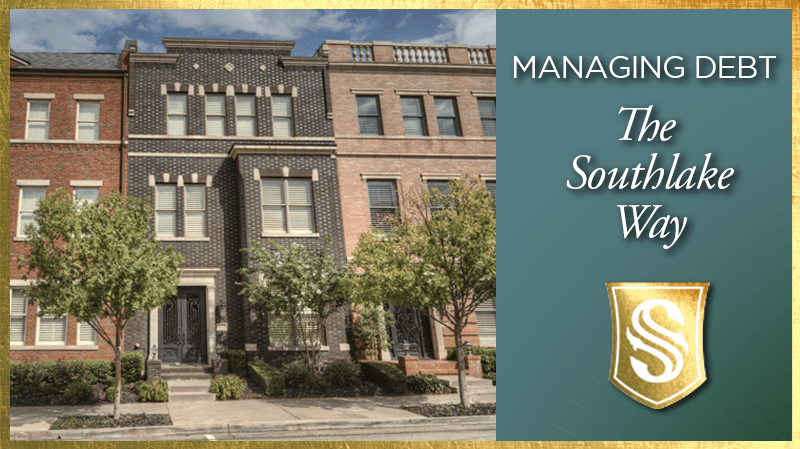
-

- City of Southlake
-

- No new property tax-supported debt in FY 2020, thanks to managing debt the Southlake way

At the most recent City Council meeting on September 3, City Council had the first reading to approve and adopt the proposed FY 2020 budget. Discussed during the meeting was the City’s debt strategy.
Debt management has been a key financial principle that has guided the development of the City’s budget for many years.
The City uses several methods to reduce the debt obligations including:
“These techniques and strong bond ratings have allowed for a reduction in the City’s property tax-supported debt by 61% since 2010, in spite of ongoing infrastructure development. Debt as a percentage of assessed value has decreased from over 3% in 2002 to a projected 0.34% in 2020,” said Chief Financial Officer Sharen Jackson.
The good news about debt
“For the sixth straight year, there will be no new property tax-supported debt. The City will use cash to fund all General Fund capital needs. For FY 2020, $8.3 million in cash will be used to pay for these capital projects. This means that property taxpayers will not see an increase in the amount of debt that they are responsible for repaying,” said City Manager Shana Yelverton.
About 96% of the property tax-supported debt will be paid off over the next 10 years. “That’s in direct alignment with the strategy of increasing the amount of cash that we’re putting toward the projects as well as using short amortizations when we do issue bonds,” said Jackson.
The City’s debt tax rate is also being reduced for the second consecutive year. The City’s conservative approach to managing debt, aggressive amortization, consistent monitoring of favorable market conditions, and refinancing existing debt all contributed to reducing the debt portion of the City’s tax rate by 20% since FY 2018, bringing the proposed debt rate for FY 2020 to 8 cents per $100 valuation.
Property tax-supported debt per capita is being reduced as well. At 41 cents for every $100 of valuation, the City of Southlake’s property tax rate supports basic city services such as public safety, street maintenance, library and community services. It also helps pay off the debt that’s been incurred for city infrastructure such as new roadway construction and expansion.
“Again the City’s use of cash and aggressive amortization schedules when debt is issued have paid off for residents. The City has reduced the property tax-supported debt per capita from $3,506 in 2010 to $1,197 in 2020,” said Jackson.
What you need to know about the City’s debt management
Debt can be a good thing in moderation. Some debt is necessary and appropriate to ensure intergenerational equity. In other words, paying cash for 100% of capital projects would front-load the cost of 20-year assets on today’s taxpayer.
The City continuously analyses market conditions to determine if more favorable interest rates are available for existing debt. Most recently, the City refunded almost $19.3 million in debt in FY 2019. This resulted in almost $2.9 million in savings over the life of the debt.
Voter approved special sales tax levies have been pledged to pay for bonds used to construct facilities identified in the City’s parks and trails master plans, as well as the public safety facilities
Since 1994, the City has put voter-authorized sales tax dollars to work on the upkeep and construction of Southlake’s beautiful parks system. The sales tax monies help with the initial cash payments that jump-start many of our big projects. Sales tax district monies from the Southlake Parks Development Corporation Fund and the Community Enhancement and Development Corporation Fund pay for the balance of projects like Bicentennial Park and Champions Club.
Cash funding to reduce debt
The FY 2020 budget proposes the use of cash to fund all General Fund capital improvement projects for the year. The City has extensive infrastructure that needs to be maintained, this cash funding strategy has allowed for the City to balance the payment and timing of expensive CIP projects.
“In the last 10 years, from FY 2010 including this proposed budget, we’ve transferred $45.5 million of cash to fund our Capital Improvement Program which is an agreement with our debt strategy of minimizing our debt burden to the residents,” Jackson explains.
“This year we are going to fund 100% of the CIP with cash. A large portion of that is coming from the Strategic Initiative Fund. We are also using residual dollars unspent from past projects and revenues from our other special revenue funds to pay for projects in the CIP. The good news is that we’re not increasing our debt burden in the current fiscal year, ,” Jackson continues.
“The City takes its debt obligation very seriously, said Yelverton. “Several years ago, we worked with the City Council to establish a strategy to reduce the debt as a percentage of assessed valuation over the long term. It’s good to see that percentage decrease year after year.”
Want to learn more about the proposed FY 2020 budget and the City’s debt management? Visit the website at www.CityofSouthlake.com/FY2020 for more information.